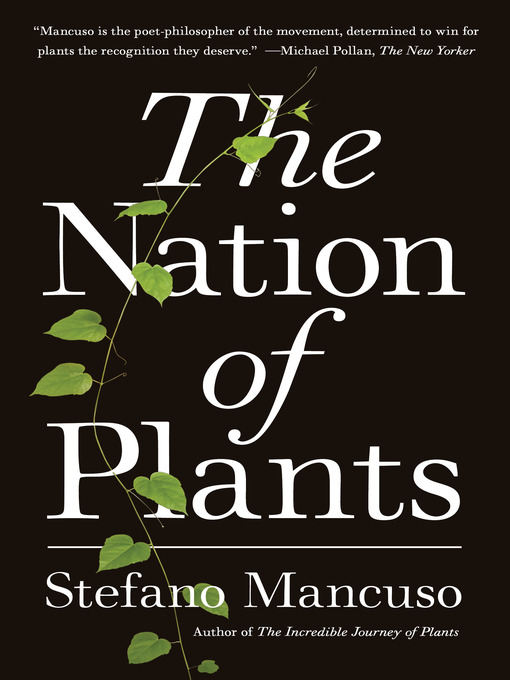
The Nation of Plants
- اطلاعات
- نقد و بررسی
- دیدگاه کاربران
نقد و بررسی

January 1, 2021
Both humorous and sobering, the latest book by Mancuso (director, International Laboratory of Plant Neurobiology; The Incredible Journey of Plants) offers relevant insight into the lives of plants and humankind. The book offers an interesting premise: if plants could have a voice on the world stage, what would they say? He maintains that this would not be only a benefit for plants themselves, but for all life on Earth. Plants are adept at cooperating with other living organisms to survive, something that humans can learn from. To make his case, Mancuso gives an imaginary address on behalf of all plants to the United Nations and lists eight articles of their constitution. It sounds whimsical, but several engaging points are provided with historical and scientific examples, backed by footnotes throughout. Just one of the examples and revelations growing from Mancuso's arguments is that plants have learned to migrate in order to survive, something that humans must do in times of war or famine. The constitution itself will also give readers pause. The book is not just a call to protect the environment, but to help one another. VERDICT Readers who appreciate slim books packed with a social punch and science anecdotes (prickly pears and lichen are especially interesting) will enjoy this offering. Another recommended, thought-provoking read from Mancuso.--Elissa Cooper, Helen Plum Memorial Lib., Lombard, IL
Copyright 2021 Library Journal, LLC Used with permission.

January 15, 2021
A renowned scientist delivers a simple yet urgent call to action on behalf of Earth's multitude of plants: Use us to save humanity. As leading plant neurobiologist Mancuso writes, "plants are what make Earth the planet we know. Without them, our planet would very much resemble the images we have of Mars or Venus: a sterile ball of rock." Sadly, the author demonstrates how humans have inflicted unimaginable damage on all varieties of plants during the short time we have controlled Earth. From deforestation to underestimating the fullness of plant life, humans "behave like children who wreak havoc" because of their "total incomprehension of the rules that govern the existence of a community of living beings." In this slim but powerful book, which advances similar arguments as The Incredible Journey of Plants and The Revolutionary Genius of Plants, Mancuso responds to this threat by imagining a constitution written by plants, complete with specific articles to serve as the pillars on which plant life rests. Despite the author's sometimes tongue-in-cheek writing style, which most readers will find refreshing and pleasant, the subject matter is dead serious. Each article of the constitution builds on the idea that plants have brilliantly evolved to thrive through symbiosis with other ecosystems, as opposed to the human tendency to lay waste to them. Mancuso concludes his elegant and cogent argument with straightforward advice accessible to anyone: "There should be just one simple rule: wherever it is possible for a plant to live, there must be one. Unlike many of the alternative proposals, this measure would require only negligible costs, would improve people's lives in myriad ways, would not demand any revolution in our habits, and would have a great impact on the absorption of carbon dioxide. Let's defend our forests and cover our cities with plants. The rest will not take long to follow." Insightful and arresting, this book offers an achievable road map to a more "radiant future."
COPYRIGHT(2021) Kirkus Reviews, ALL RIGHTS RESERVED.

March 1, 2021
This corollary to Mancuso's well-received Brilliant Green (2018), which explored the keen, long-overlooked intelligence of the plant world, posits that the Nation of Plants deserves its own "constitutional" defense, an idea that stems from the reality that few humans control that thin surface layer of Earth holding the only known life in the universe. "At times, when I think about it," Mancuso writes, "I go into a dizzy spell and feel as though I've been displaced into one of those infinite parallel universes where logic doesn't work in the way we're used to." Thus, he argues, among other things, the Nation of Plants should sit atop the food chain as the engine for Earth's sustenance; consumption of any resource that can't be reconstituted for future generations should be prohibited, and, given humanity's propensity for screwing up the balance of nature, the rights of "natural communities" should be inviolable. Mancuso's "playful" if sometimes opaque exercise belies the utter seriousness, if not desperation, of his deeply informed message.
COPYRIGHT(2021) Booklist, ALL RIGHTS RESERVED.

March 29, 2021
Botanist Mancuso (The Revolutionary Genius of Plants) showcases his discoveries about plant communication in this passionate if quirky manifesto. He imagines that plants have been recognized as their own nation, whose representatives address the United Nations to appeal for human cooperation to save Earth from catastrophic damage. In this scenario, a representative asserts plants’ right to respect, noting that Earth is only alive because plantlife generates oxygen and serves as a food and energy source. Mancuso fleshes out his conceit with the nation of plants’ own constitution, the articles of which include a guarantee of “the right to clean water, soil, and atmosphere” and prohibit the “consumption of any resource that can’t be reconstituted for future generations of living beings.” Stepping out of the plant-nation setup, Mancuso suggests a strategy of combating global warming by increased plantings that will enable absorption of significant amounts of carbon dioxide, and devoting more funding to plant research. The whimsical approach will not be for every reader, but those open to suspending disbelief will benefit from a concise summary of plants’ past, present, and possible future role in sustaining life on Earth. Lewis Thomas’s fans should take a look.




دیدگاه کاربران